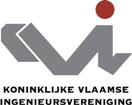Belgium
K VIV
Koninklijke Vlaamse Ingenieursvereniging
Royal Flemish Society of Engineers
MISSION & OBJECTIVES
The K VIV was founded in 1928 and represents more than 11.000 engineering members. It is the only professional organisation in Flanders uniting the university trained engineers, including agricultural and military engineers, having obtained a degree after 5 years of study. They have graduated from the Catholic University of Leuven, the University of Ghent, the Free University of Brussels or the Royal Military Academy, which have conferred on them the legally protected title of “ingenieur”, abbreviated “ir.”. The K VIV also accepts other engineers graduated from universities which are recognised as equivalent to the universities mentioned above.
The K VIV’s main objectives are to:
- Improve the professional interests of university trained engineers
- Improve the contacts between the university trained engineers
- Improve the contacts between the faculties
- Improve the technical knowledge of the Flemish people as a whole
The K VIV also aims to stimulate its members’ consciousness about their social responsibility during the exercise of their professional activity. With its newly conceived “K VIV Ethical Code”, the K VIV wishes to testify to its awareness of the role and responsibility of engineers in our society. It arose from a round of self-reflection and invites engineers to consider the ethics of their own jobs from time to time.
BASIC STRUCTURE
The K VIV offers a wide range of activities and services, channelled through different subdivisions.
Lo Ma (‘Loopbaan en Maatschappij’)
The main goal of this first department/subdivision is to promote the engineers’ professional interests. It maintains close relations with enterprises and is the favoured go-between in official governmental contacts.
On a national level, it cooperates closely with its sister organisation, the FABI (Fédération Royale d’Associations Belges d’Ingénieurs Civils et d’Ingénieurs Agronomes), within the scope of the Belgian Confederation of university-trained engineers, abbreviated to C.ir. There are frequent contacts with KIVI NIRIA, the Royal Institution of engineers in the Netherlands.
On a European level, K VIV is an active member of CLAIU-EU, the ‘Liaison Committee of Associations of University Engineers’, which strives for the recognition of the long-cycle engineering profession in all EU countries.
Contact: Ingenieurshuis- K VIV,Desguinlei 214, 2018 Antwerpen- Belgium; Tel.: +32 3 260 0840, Fax: +32 3 216 06 89; e-mail: info@kviv.be, http://www.kviv.be
________________________________________________________________________________________
FABI- Fédération Royale d’Associations Belges d’Ingénieurs civils et d’Ingénieurs agronomes
BASIC STRUCTURE
FABI is a federation of 10 associations totalling 11.600 university trained engineers mainly from the French speaking part of Belgium. Each association is independent and emanates from the university where the members engineers got their training, and is promoting the professional interests and social environment of the engineer.
Because these associations have some identical concerns they felt the necessity to rally into a federation, called FABI (Fédération royale d’Associations Belges d’Ingénieurs civils et d’Ingénieurs agronomes).
On a national level FABI cooperates closely with its sister organization K VIV within the scope of the Belgian Confederation of University Trained Engineers (C.Ir).
ACTIVITIES
The FABI activities can be divided into 6 categories:
Ethical matters
The deontology of the engineer has been laid down in 1989 in the Charter of the Engineer. The FABI organizes on a regular basis events aiming at the promotion of the engineer in his political environment on the one hand, and make the engineer thinking about his social role in the society on the other hand.
Social matters
The engineer in a private company.
A “permanent commission on social matters and human problems in labour” examines all related concerns. Annually, the monthly remuneration of a beginning young engineer is proposed and published as a reference. Biennially, an inquiry is launched amongst 4000 engineers all categories in order to monitor the evaluation of the real salary.
The engineer in public service
A working group “public service” has been established with as aims:
- examine punctual problems encourtered by engineers in the public service and propose solutions
- draft a code for engineers employed in the civil service with a special stress on the role and the functions he ought to assume.
Engineer consultant
A working group FABI- K VIV “Auteur de projets” annually reviews the different types of interventions of engineers-consultant in building projects. They are well-known and used in contract negotiations.
Retired engineers
A special arrangement exists with the Federation of Pensioners and gives the possibility to the retired and future retired engineers to be protected in their interests.
Juridictional aid
Engineers having problems in the area of social legislation are assisted free of charge.
PROTECTION OF THE TITLE OF ENGINEER
FABI intervenes in all cases of misuse of the title of engineer.
INTERNATIONAL RELATIONS
FABI, together with the sister organization K VIV, is very active in protecting the title of the university educated engineer and his professional interests at European and international level.
PUBLICATIONS
FABI publishes quarterly the “Journal de l’Ingénieur”, yearly a “Vade-mecum de l’Ingénieur” and every two years a directory comprising the name and all important data of the 11.600 members.
Contact:
FABI -Fédération Royale d’Associations Belges d’ingénieurs civils et d’ingénieurs agronomes asbl
Rue Hobbema 2 ,1000 Brussel , Belgium; tel.: 00-32-(0)2/734 75 10 ; fax: 00-32-(0)2/734 53 15
e-mail: fabi@fabi.be ; website: http://www.fabi.be

